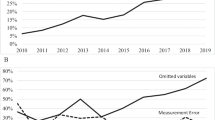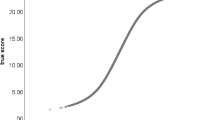Abstract
We study a variant of the conventional keeping-up-with-the-Joneses setup, in which heterogeneous-ability agents care both about consumption and leisure and receive an utility premium if their consumption exceeds that of the Joneses’. Unlike the conventional setup in which all agents are assumed to want to participate in the rat race of staying ahead of the Joneses, our formulation explicitly permits the option to drop out. Mean-preserving changes in the spread of the underlying ability distribution, via its effect on the economy-wide composition of rat-race participants and drop-outs, have important consequences for induced distributions of leisure and income, consequences that are unobtainable using conventional keeping-up preferences.
Similar content being viewed by others
References
Abel A.: Asset prices under habit formation and catching up with the Joneses. Am Econ Rev 80, 38–42 (1990)
Banerjee A.V., Newman A.F.: Risk-bearing and the theory of income distribution. Rev Econ Stud 58, 211–235 (1991)
Becker G.S., Murphy K.M., Werning I.: The equilibrium distribution of income and the market for status. J Polit Econ 113, 282–310 (2005)
Benabou R.: Inequality and Growth. NBER Macroeconomics Ann, pp. 11–74. MIT Press, Cambridge (1996)
Clark A.E., Oswald A.J.: Comparison-concave utility and following behavior in social and economic settings. J Public Econ 70(1), 133–150 (1998)
Corneo G., Jeanne O.: Pecuniary emulation, inequality and growth. Eur Econ Rev 43, 1665–1678 (1999)
Creedy J.: The Dynamics of Inequality and Poverty. Edward Elgar, MA (1998)
Dupor B., Liu W.-F.: Jealousy and equilibrium overconsumption. Am Econ Rev 93(1), 423–428 (2003)
Dynan K.E., Ravina E.: Increasing income inequality, external habits, and self-reported happiness. Am Econ Rev 97, 226–231 (2007)
Drakopoulos S.A.: The paradox of happiness: towards an alternative explanation. J Happiness Stud 9(2), 303–315 (2008)
Freeman S.: Equilibrium income inequality among identical agents. J Polit Econ 104, 1047–1064 (1996)
Friedman M., Savage L.: The utility analysis of choices involving risk. J Polit Econ 56, 279–304 (1948)
Galí J.: Keeping up with the Joneses: consumption externalities, portfolio choice, and asset prices. J Money Credit Bank 26, 1–8 (1994)
Gall T.: Lotteries, inequality, and market imperfection: Galor and Zeira go gambling. Econ Theory 34, 359–382 (2008)
Galor O., Zeira J.: Income distribution and macroeconomics. Rev Econ Stud 60, 35–52 (1993)
Galor O.: Convergence? Inferences from theoretical models. Econ J 106, 1056–1069 (1996)
García-Peñalosa C., Turnovsky S.J.: Growth and income inequality: a canonical model. Econ Theory 28, 25–49 (2006)
García-Peñalosa C., Turnovsky S.J.: Consumption externalities: a representative consumer model when agents are heterogeneous. Econ Theory 37, 439–467 (2008)
Gordon C.H.: A note on the tenth commandment. J Bible Rel 31, 208–209 (1963)
Hartley R., Farrell L.: Can expected utility theory explain gambling? Am Econ Rev 92, 613–624 (2002)
Kawamoto K.: Status-seeking behavior, the evolution of income inequality, and growth. Econ Theory 39, 269–289 (2009)
Kuhn P., Lozano F.: The expanding workweek? Understanding trends in long work hours among U.S. men, 1979-2006. J Lab Econ 26, 311–343 (2008)
Lewis G.W., Ulph D.T.: Poverty, inequality, and welfare. Econ J 98, 117–131 (1988)
Long N.V., Shimomura K.: Relative wealth, status-seeking, and catching-up. J Econ Behav Org 53, 529–542 (2004)
Prescott E.C.: Why do Americans work so much more than Europeans? Q Rev Fed Reserve Bank Minneap 28, 2–13 (2004)
Sadler M.A.: Escaping poverty: risk-taking and endogenous inequality in a model of equilibrium growth. Rev Econ Dyn 3, 704–725 (2000)
Author information
Authors and Affiliations
Corresponding author
Additional information
Earlier versions of this paper were presented at the Midwest Macroeconomic Meetings, the 23rd Annual Congress of the European Economic Association, ZEW Workshop on Inequality and Poverty in the Global Economy, Mannheim, and Swarthmore College. We thank participants at these conferences. We also acknowledge useful input from a referee and a coeditor of this journal. Special thanks goes to David Stockman, who, over cocktails at the House of Blues in Cleveland, posed a question that sparked it all: “What if agents can’t keep up?”.
Electronic Supplementary Material
Rights and permissions
About this article
Cite this article
Barnett, R.C., Bhattacharya, J. & Bunzel, H. Choosing to keep up with the Joneses and income inequality. Econ Theory 45, 469–496 (2010). https://doi.org/10.1007/s00199-009-0494-5
Received:
Accepted:
Published:
Issue Date:
DOI: https://doi.org/10.1007/s00199-009-0494-5




